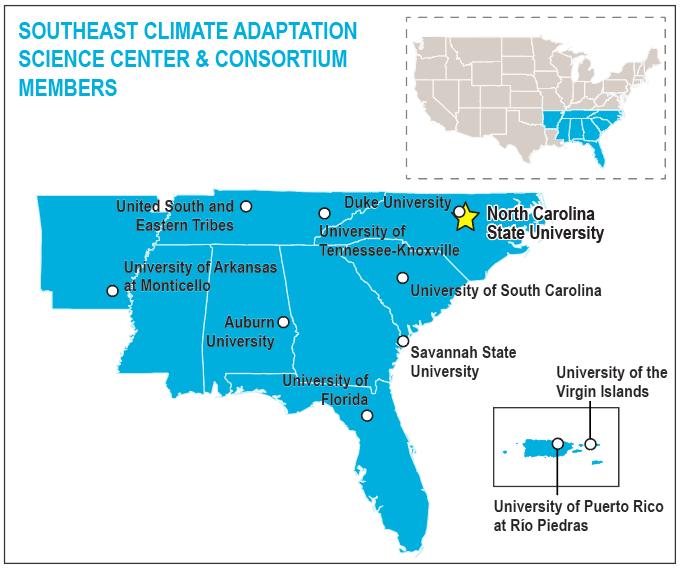Duke Experts Help Drive Growth of Regional Climate Adaptation Network
Duke University has renewed its commitment to a consortium that is providing actionable science to help Southeastern communities and ecosystems adapt to a changing climate.
 The U.S. Geological Survey (USGS) awarded a new cooperative agreement to North Carolina State University on Aug. 1 to continue hosting the Southeast Climate Adaptation Science Center (SE CASC) for the next five years. Duke is one of six returning members to the SE CASC consortium. The group also welcomes five new institutions with the signing of the agreement.
The U.S. Geological Survey (USGS) awarded a new cooperative agreement to North Carolina State University on Aug. 1 to continue hosting the Southeast Climate Adaptation Science Center (SE CASC) for the next five years. Duke is one of six returning members to the SE CASC consortium. The group also welcomes five new institutions with the signing of the agreement.
“Through the Southeast Climate Adaptation Science Center, Duke scholars have been partnering with colleagues across the region to co-produce analysis, maps, and resources to help resource managers and decision-makers,” said Lydia Olander, director of the Ecosystem Services Program at the Nicholas Institute for Energy, Environment & Sustainability and an adjunct professor at the Nicholas School of the Environment. “We are looking forward to working with our new consortium partners to further address how nature can support climate adaptation needs throughout the Southeast.”
Olander serves as one of Duke’s co-principal investigators in the SE CASC, along with two faculty members from the Nicholas School of the Environment: Brad Murray, professor of geomorphology and coastal processes, and Ryan Emanuel, associate professor of hydrology.
Established in 2010, the SE CASC is part of a national network of nine regional centers, each based out of a host university with a consortium of university and non-university partners. After a first phase with NC State as the sole host, the Southeast center added Duke and four other universities as partners in 2017. In the ensuing years, the consortium has worked with USGS scientists and management partners to provide regionally relevant scientific information, tools and techniques to resource managers and communities within its footprint.
Duke projects developed over the last five years with support from the center include:
- Three natural and working lands dashboards that make detailed data about the benefits of North Carolina’s forests, farmlands and wetlands easily accessible online.
- A web map of North Carolina pocosins to help identify opportunities for restoration of these unique wetlands and as a first step to improving estimates of how much carbon they store.
- A modeling study that shows how rising sea levels could drive coastal marshes inland in mid-Atlantic states, releasing carbon into the atmosphere in the process.
- A database of government agencies, non-profit organizations and academic institutions intended to assist those interested in coastal resilience in the Southeast to quickly find others doing related work.
Duke’s participation in the Southeast Climate Adaptation Science Center aligns with the goals of the Duke Climate Commitment, which unites the university’s education, research, operations and external engagement missions to address climate challenges.
The 11 institutions that now comprise the SE CASC consortium are:
- North Carolina State University (host)
- Auburn University
- Duke University
- Savannah State University
- United South and Eastern Tribes
- University of Arkansas at Monticello
- University of Florida
- University of Puerto Rico at Rio Piedras
- University of South Carolina
- University of Tennessee-Knoxville
- University of the Virgin Islands
# # #
For additional information:
- NC State Will Lead New Southeast Climate Adaptation Science Center Consortium, Southeast Climate Adaptation Science Center news release, Aug. 7, 2023
- USGS Announces Expanded Consortiums for Alaska, Northwest, and Southeast Climate Adaptation Science Centers, U.S. Geological Survey news release, Aug. 1, 2023



